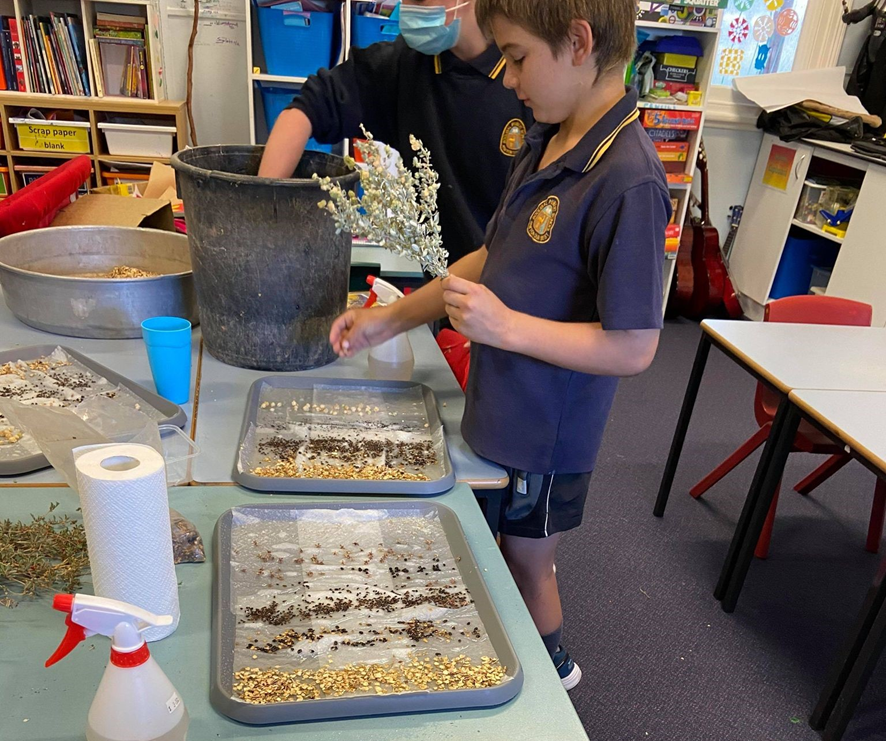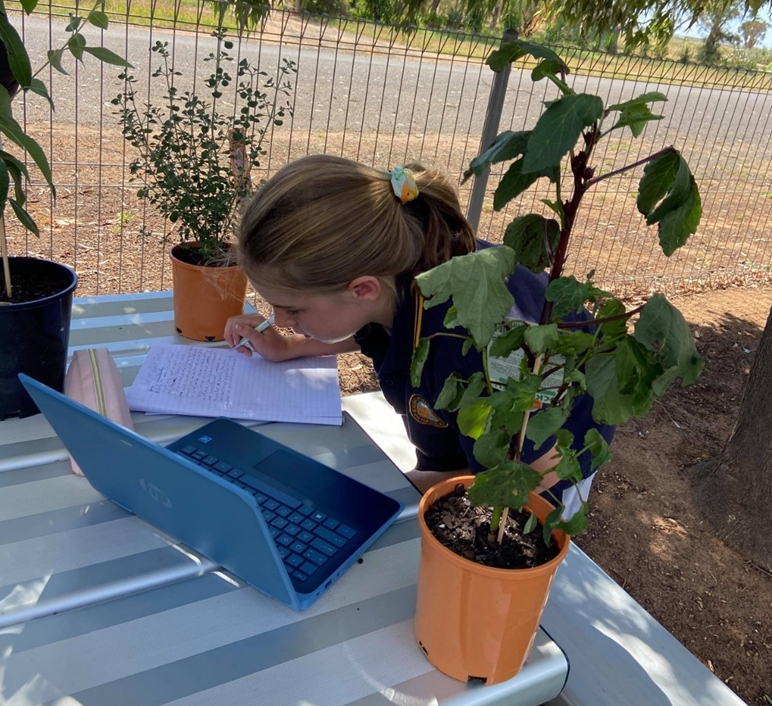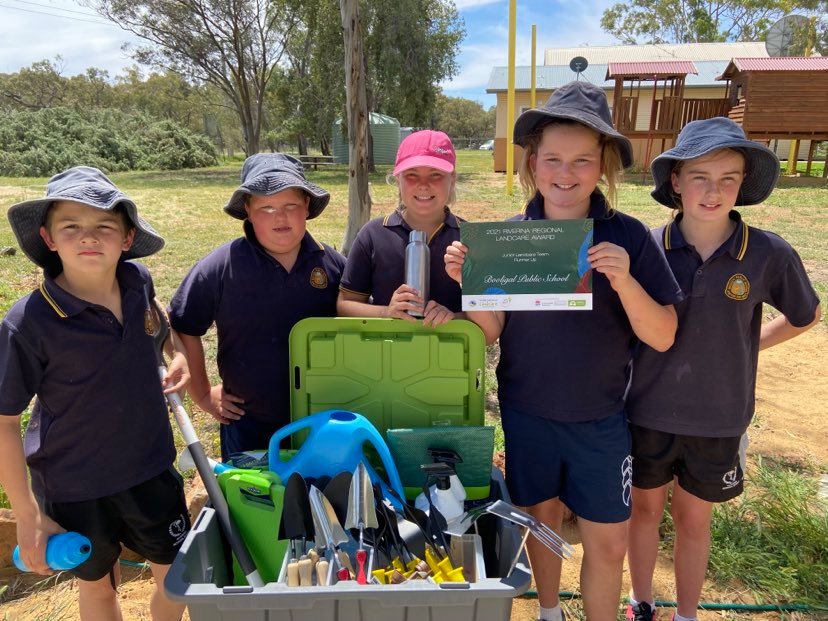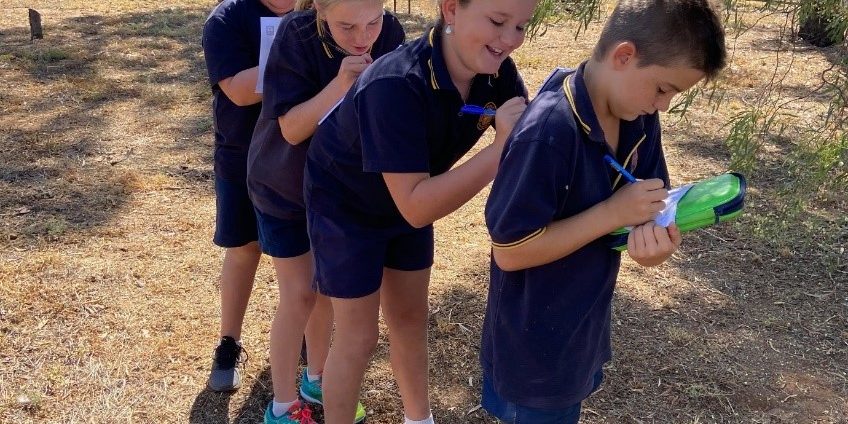Booligal Public School
Booligal Public School have undertaken an extensive project to develop a native garden and environmental education initiative.
For further information on Booligal Public School, view their website here.

A garden for learning
Through the planning, design and development of their new garden, students are learning about biodiversity, native species and their Aboriginal uses, soil, minibeasts, water, seed collection, propagation and planting.
The students are excited to use and care for the garden, and have learnt the importance of native plants, weed control, water conservation. They are also developing an understanding of how your actions can have a dramatic impact on preserving the environment, increasing natural habitats and ecosystems, and reducing the impacts of climate change.
Designing the garden for multiple solutions
Restoring biodiversity. The native garden will restore the natural environment and allow birds, insects and animals to build habitats. The school plans on using environmental biodiversity as an analogy for community biodiversity, demonstrating how success in both is achieved by cooperation rather than competition, and how all beings can play their part in the greater scheme of things. We will teach the community that biodiversity is especially important in this garden to manage pests, and help improve soil and plant quality without the use of chemicals and fertilisers.
Providing habitat. With organic soil, mulch, large garden beds, and a mixture of native trees and shrubs, the school will be creating an array of habitats in what was once an empty block. The students hope to attract insects, lady beetles, bees, butterflies, frogs, spiders and native birds to the garden – all sorts of diversity that was absent before.
Minimising soil erosion. The role of groundcover plants, and deep tree roots, will demonstrate to the students the role they can play in retaining the soil and stopping erosion.
Supporting threatened species recovery. Many of the important plant species which once provided habitat for foraging and breeding are

now missing in the Booligal landscape, due to over-grazing or clearing. Local plantings often contain native species, but not those local to the Booligal area – with species chosen for hardiness or perceived beauty, rather than their role as habitat. These non-endemic plant species now take up niches that would previously have been occupied by endemic species. The school plans to add more local plants, such as Wattles (Acacia oswaldii and Acacia salicina) and Hop bushes (Dodonea spp.) together with Saltbush groundcovers, Blackbox and White Cypress Pine. Returning the species that were once prevalent in the area will increase the local biodiversity and provide complexity and structure to the existing habitat.
Planting endemic species has not been without its problems though – Booligal is a small, isolated town 60 km from Hay, so finding seedlings of species endemic to the area has proven difficult! The school has overcome this challenge by creating a species list, working with various nurseries (some over 200 km away) and propagating their own seedlings from locally-collected seeds.
Addressing climate change impacts on the natural environment. The students are building their knowledge regarding species selection and responsible revegetation and habitat management choices. Correct species selection in a semi-arid area like Booligal is essential, as many non-local species have died in recent droughts, even after years of care. Suitable local species will be better adapted to the conditions, require less watering and be more likely to survive under drier conditions. The knowledge the students have gained about why this is important, and how native birds and other animals use these local plant species, has also encouraged their interest in the plants they are growing and instilled strong ownership in the project.
Inspiring the local community
The students have learnt how to collect, germinate and propagate local plants. They are learning about the variety of herbs, vegetables and fruit trees, encouraging health and good nutrition, showing them how to get the most out of their garden, how to maintain, replant and harvest fresh produce from the garden, and generally get involved in the garden as a community hub. Using 
native plants, the garden is also being used as a cultural educational tool, giving students the opportunity to engage with members of the local Indigenous community.
The township of Booligal is located amongst the vast open and virtually treeless plains. Community members are keen to learn from the school about how best to care for a local native garden, and understand the importance of natural resource management. Through their garden, the school aims to teach the wider community about living sustainably, preserving our beautiful environment, the importance of water conservation, weed management and the importance of biodiversity.
The garden will be available for Booligal Public School and Hay Plains Landcare to run workshops to educate landholders, school kids, community groups and locals. The community can come together and share knowledge, while providing a culturally appropriate and significant gathering space and connection with country.
A big congratulations to Booligal Public School !!!

This project has been made possible by funding through Junior Landcare, TransGrid and Murrumbidgee Landcare Inc







